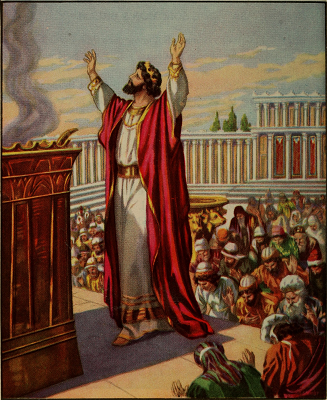July 14, 2011.
You are forgetful. I am forgetful. We all need reminders. Jesus gave us one: “This do in remembrance of me.” For how long? “As often as you eat this bread and drink this cup you do show the Lord’s death till He come” (1 Cor. 11:24-26). Today, “we walk by faith, not by sight” (2 Cor. 5:7). Salvation is by faith. Hope in His second coming is by faith. The weekly Lord’s Supper helps to keep us focused on who and what really matters.
When Jesus comes again, we won’t need any more reminders. He will be visibly with us. But someone will say, “We will still need to be reminded that His death on the cross made it all possible.” Let’s assume that for a moment. What kind of a reminder would be good? “Animal sacrifices,” say today’s popular prophecy teachers — those who teach the Secret Rapture, followed by the Tribulation, the Second Coming, and the Millennium. To simplify matters, I call them Futurists. Futurism says that in the Millennium, the temple will be rebuilt in Jerusalem and animal sacrifices will be reinstituted as a memorial of Jesus’ sacrificial death for us.
This concept of future animal sacrifices as a memorial is based on a literal interpretation of Ezekiel 40-48. However, does the text say anything about “memory” or “memorial”? Unlike Isaiah 53, Ezekiel’s final chapters do not predict Messiah’s death. Rather, they say such things as: “They shall slay the burnt offering and the sacrifice for the people” (44:11); and “the sin offering, and the meat offering, and the burnt offering, and the peace offerings, to make reconciliation for the house of Israel” (45:17). Sin offerings and sacrifices “to make reconciliation.” It does not say to remember that Messiah already made reconciliation. Ezekiel literally says that animal sacrifices are to “make” reconciliation.
This, my friends, is a major reason why many of us cannot accept a literal future fulfillment of Ezek. 40-48. Hebrews 10:12 declares of Jesus: “This man, after he had offered one sacrifice for sins for ever, sat down on the right hand of God.” One sacrifice for ever! But, if Ezek. 40-48 is not to be interpreted literally, what then? Hebrews 9:1-9 and 10:1 tell us that the tabernacle and sacrifices of the First Covenant were a “figure” (“symbolic”) and “shadow” of the realities in the New Covenant. This being so, it seems most sensible to consider the final chapters of Ezekiel as being a part of that OT shadow.
Intimately connected with the sacrifices in Ezek. 40-48 are the Levitical priests, mentioned multiple times, who are in charge of the sacrifices. Contrasting the Levitical priesthood with the priesthood of Christ, Heb. 7:12 says, “the priesthood being changed.” Hebrews describes the priesthood of Christ as “for ever” (5:6; 6:20; 7:17, 21), and “unchangeable” (7:24). That makes a revival of the Levitical priesthood out of the question. A future literal fulfillment of Ezek. 40-48 contradicts the Holy-Spirit-inspired words in Hebrews.
Though there are differences in detail, the worship pictured in the closing chapters of Ezekiel harmonizes perfectly with the Law of Moses: it is all about Israel, circumcision, temple, altar, animal sacrifice, Levitical priests, feasts, New Moons, Sabbaths, and atonement for Israel. Therefore, just as these things written in the Law of Moses were a figure-shadow of the New Covenant reality in Christ, so must it be with the final chapters of Ezekiel — they must be a part of that figure-shadow, not some future reality.
Let us diligently remember our Lord every Lord’s Day around the Lord’s table. Why does Scripture tell us to do it “until He comes”? Because you remember someone who is physically absent; you don’t “remember” someone you see. When Jesus returns, we will no longer walk by faith. We will then walk by sight. “When He shall appear, we shall be like Him; for we shall see Him as he is” (1 John 3:2). Hallelujah!
